Eerdmans Reformed Thought and History Collection (23 vols.)
Digital Logos Edition
Overview
Eerdmans Reformed Thought and History Collection brings together 23 volumes which illuminate areas of Reformed theology such as infant baptism, stewardship of God’s creation, the Eucharist, and more. Learn from great Reformed thinkers such as John Calvin, Frans H. Breukelman, and Abraham Kuyper. Hear what contemporary theologians are saying on issues like justification. Gain insight into Reformed theology in relation to modern culture. This collection offers scholarly reflection and practical understanding for Christians today.
In the Logos editions, these volumes are enhanced by amazing functionality. Scripture citations link directly to English translations, and important terms link to dictionaries, encyclopedias, and a wealth of other resources in your digital library. Perform powerful searches to find exactly what you’re looking for. Take the discussion with you using tablet and mobile apps. With Logos Bible Software, the most efficient and comprehensive research tools are in one place, so you get the most out of your study.
Want an even better deal? Get more books at a bigger discount when you order the Eerdmans Bible Reference Bundle 2!
Take a look at Amandus Polanus’ A System of Christian Theology.

Key Features
- Explores the history of Reformed theology
- Addresses contemporary theological issues
- Examines topics like infant baptism, justification, and the Eucharist
Product Details
- Title: Eerdmans Reformed Thought and History Collection
- Publisher: Eerdmans
- Volumes: 23
- Pages: 6,686
- Christian Group: Reformed
- Resource Type: Monographs
- Topic: Reformed
Individual Titles
- The Structure of Sacred Doctrine in Calvin’s Theology by Frans H. Breukelman
- Neither Calendar nor Clock: Perspectives on the Belhar Confession by Piet J. Naudé
- Thinking with the Church: Essays in Historical Theology by Brian Gerrish
- Natural Law and the Two Kingdoms: A Study in the Development of Reformed Social Thought by David VanDrunen
- Institutes of the Christian Religion: The First English Version of the 1541 French Edition by John Calvin
- Institutes of the Christian Religion, 1536 Edition by John Calvin
- What Is Justification About? Reformed Church in an Ecumenical Theme by Michael Weinrich and John P. Burgess
- Do This in Remembrance of Me: A Ritual Approach to Reformed Eucharistic Theology by Martha L. Moore-Keish
- English Hypothetical Universalism: John Preston and the Softening of Reformed Theology by Jonathan D. Moore
- Rediscovering the Natural Law in Reformed Theological Ethics by Stephen J. Grabill
- He Shines in All That’s Fair: Culture and Common Grace by Richard J. Mouw
- Calvin’s Ladder: A Spiritual Theology of Ascent and Ascension by Julie Canlis
- Dutch Calvinism in Modern America: A History of a Conservative Subculture by James D. Bratt
- Children of Promise: The Case for Baptizing Infants by Geoffrey W. Bromiley
- Sacramental Teaching and Practice in the Reformation Churches by Geoffrey W. Bromiley
- Body, Soul, and Life Everlasting by John Cooper
- Remember Creation: God’s World of Wonder and Delight by Scott Hoezee
- The Riddle of Grace: Applying Grace to the Christian Life by Scott Hoezee
- Creation Regained: Biblical Basics for a Reformational Worldview by Albert M. Wolters
- By Oath Consigned: A Reinterpretation of the Covenant Signs of Circumcision and Baptism by Meredith C. Kline
- Principles of Conduct: Aspects of Biblical Ethics by John Murray
- Regnum Caelorum: Patterns of Millennial Thought in Early Christianity by Charles E. Hill
- Abraham Kuyper: A Centennial Reader by James D. Bratt
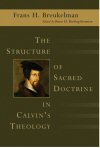
The Structure of Sacred Doctrine in Calvin’s Theology
- Author: Frans H. Breukelman
- Translator: Martin Kessler
- Publisher: Eerdmans
- Publication Date: 2010
- Pages: 264
Having completed three collections of work during his lifetime, Dutch theologian Frans H. Breukelman left much of his work to be published by a later generation of students. Rinse H. Reeling Brouwer has taken up the task, resulting in The Structure of Sacred Doctrine in Calvin’s Theology.
Brouwer brings to life Breukelman’s extensive study of Calvin’s doctrine from the first form of his Institutes—the 1536 basic catechism—through all of its incarnations to the 1559 final, definitive form. Breukelman illuminates the deep theological significance of Calvin’s many changes to the Institutes, showing that the form and structure of doctrine reveal the hidden direction of the content. Finally, Brouwer focuses on Breukelman’s intriguing belief that the entire Reformed doctrinal tradition has proceeded along the line of only one of the possibilities in the structure of Calvin’s theology.
Rinse Reeling Brouwer has brought to the English-speaking world the erudite scholarship of Dutch theologian Frans Breukelman. . . . Breukelman weighs in on controversies between Edward Dowey and T.H.L. Parker on proper interpretation of Calvin, and he assesses Karl Barth’s legacy as a Calvinist theologian. Surprising and instructive insights are gleaned along the way on biblical narrative and the ‘historicizing’ of doctrine; the roots of Protestant modernism in older orthodoxy; and the relation of Calvin to Luther and Melanchthon. A rich resource for Calvin scholars!
—Katherine Sonderegger, William Meade Chair in Systematic Theology, Virginia Theological Seminary
Frans H. Breukelman (1916–1993) was a church pastor before he taught hermeneutics at the University of Amsterdam from 1968 to 1981. A brilliant improvisatory lecturer, he influenced many other pastors and theologians with his view of the interaction between biblical exegesis and dogmatic theology.
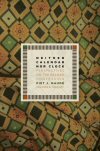
Adoption of a new confession is a rare event in church history. This book offers an astute inside look at the contemporary Belhar Confession, which arose out of the struggle against apartheid and was drafted in 1982 by the “colored” Dutch Reformed Mission Church in South Africa.
With clarity and passion Piet Naudé presents and comments on the Belhar texts themselves, explores the historical background and theological significance of Belhar, and discusses its continuing reception throughout the world. He also relates the Belhar Confession’s relevance to such current global issues as gender relations, economic justice, and the HIV/AIDS crisis.
The only up-to-date English-language book on the Belhar Confession—which is gaining significant recognition among North American churches—Neither Calendar nor Clock ultimately shows how this singular African confession powerfully articulates the gospel for the universal church today.
This volume was the winner of the 2011 Andrew Murray-Desmond Tutu Prize.
The Belhar Confession played a crucial role in overcoming apartheid in South Africa. Piet Naudé is one of the leading authorities able to reconstruct the complex genesis of this confession and its strong repercussions in South African society and across the political and ecclesial spectrum. This book is a powerful testimony to a ‘humanizing Christian theology’—a witness to God and an ethical challenge to us all.
——Michael Welker, senior professor, University of Heidelberg
Piet J. Naudé is professor of ethics and director of the Business School at Nelson Mandela Metropolitan University, Port Elizabeth, South Africa.
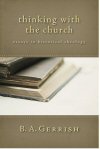
Thinking with the Church offers 12 meaty essays from a renowned historian, theologian, and Calvin scholar. In this volume B.A. Gerrish focuses on the progression of the Calvinist tradition and examines historical theology as a critical engagement with past leaders of Christian thought and their opponents.
In the first two parts the essays focus on philosophical theology, considering such questions as “What is religion?” and “What is revelation?” The third part turns directly to historical interpretation of the Calvinist tradition, viewed in the very diverse work of three of its foremost representatives—Calvin himself, Friedrich Schleiermacher, and Charles Hodge. Finally, in the fourth and fifth sections, Gerrish deals with particular Christian doctrines in which the diversity of the Calvinist tradition is apparent—the atonement, the Eucharist, and grace. Historical interpretation is the foundation throughout, but Gerrish does not exclude the critical engagement that belongs to the task of historical theology.
Brian Gerrish’s work as a historical theologian always anticipating the systematic theological task continues unsurpassed. In essay after essay, his ‘thinking with the church’ takes the gerund as seriously as the preposition, by appropriating the church’s witness critically, and so advancing both of the disciplines in which he labors so fruitfully. Of particular value in this book is its further, thought-provoking illumination of ‘tradition’ as ever the duty of—in his mentor John Calvin’s words—faithfully handing on only by first forming as best we can.
—Schubert M. Ogden, professor emeritus, Southern Methodist University
Brian Gerrish is also the author of The Old Protestantism and the New.
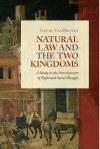
Conventional scholarship holds that the theology and social ethics of the Reformed tradition stand at odds with concepts of natural law and the two kingdoms. But David VanDrunen here challenges that status quo through his careful, thoroughgoing exploration of the development of Reformed social thought from the Reformation to the present.
This is a wonderful work all around. . . . I have never read a more useful one-volume tour through the history of Reformed debate about natural law, particularly in the twentieth century with the varieties of neo-Calvinism. . . . VanDrunen treats natural law in the context of the two kingdoms doctrine. The entire book depends upon this methodological commitment—and it works splendidly!
—F. Russell Hittinger, William K. Warren Professor of Catholic Studies, University of Tulsa
The strength of this book is the overwhelming amount of historical evidence, judiciously analyzed and assessed, that positions the Reformed tradition clearly in the natural law, two kingdoms camp. This valuable contribution to our understanding of the Christian life . . . is a much-needed and indispensable ally in the battle for the life of the Christian community in North America.
—John Bolt, professor of systematic theology, Calvin Theological Seminary
Very impressive and valuable. I know of no comparable overview of this topic. The scope is massive, the selection and treatment of representative figures are meticulous, and the potential implications are significant. . . . As a piece of focused historical research and comparative theoretical analysis, this is a first-rate piece of work!
—Max L. Stackhouse, Rimmer and Ruth de Vries Professor of Reformed Theology and Public Life Emeritus, Princeton Theological Seminary
David VanDrunen is the Robert B. Strimple Professor of Systematic Theology and Christian Ethics at Westminster Seminary California, an ordained minister, and an attorney.
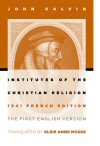
John Calvin originally wrote his famous Institutes of the Christian Religion in Latin. Beginning with the second edition of his work published in 1541, Calvin translated each new version into French, simultaneously adapting the text to suit lay audiences, shaping it subtly but clearly to teach, exhort, and encourage them. Besides reflecting a more pastoral bent on Calvin’s part, this 1541 Institutes is also notable as one of the founding documents of the modern French language.
Elsie Anne McKee’s masterful translation of the 1541 French Edition—the first-ever English version—offers full access to the brilliant mind of John Calvin as he considered what common Christian people should all know and practice.
Any who wish to encounter Calvin’s systematic theology at its most pastoral, freest from controversial preoccupations, and mediated through superlative translation, should devour this rendering of the Reformer’s own French version of the second edition of his Institutes. This volume should win Calvin many new friends.
—J.I. Packer, professor of theology, Regent College
This sparkling translation of John Calvin’s 1541 French Institutes offers modern-day readers in the English-speaking world the opportunity to read Calvin’s first version of his masterwork intended for a general audience. Elsie McKee is to be commended for her faithful yet accessible translation of this key text.
—Karin Maag, H. Henry Meeter Center for Calvin Studies, Calvin College and Seminary
John Calvin (1509–1564), one of the most important thinkers in church history, was a prominent French theologian during the Protestant Reformation and the father of Calvinism. His theological works, biblical commentaries, tracts, treatises, sermons, and letters helped establish the Reformation throughout Europe.
Calvinism has spawned movements and sparked controversy throughout the centuries. Calvin began his work in the church at the age of 12, intending to train for the priesthood. Calvin attended the Collège de la Marche in Paris at 14, before studying law at the University of Orléans and continuing his studies at the University of Bourges.
In 1532, Calvin’s first published work appeared: a commentary on Seneca’s De Clementia. The controversy of calling for reform in the Catholic Church disciplined Calvin in his writing project, and he began working on the first edition of The Institutes of the Christian Religion, which appeared in 1536. Calvin’s Commentaries and The Letters of John Calvin are also influential; both appear in the Calvin 500 Collection (108 vols.).
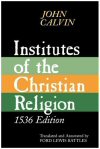
John Calvin was just 27 years old when the first edition of his Institutes was published in Basel in 1536. Building on the work of Erasmus and Luther, Calvin wrote with brilliance and passion of the many ways the church and its theology had been “deformed,” and he presented a case for restoring the church and theology to its pristine purity. Calvin’s “little book”—as he affectionately called it—grew in size through the rest of his life; eventually, this early, shorter version evolved into what is now known as the Institutes, the 1559 edition, which Calvin considered the authoritative form of his thought for posterity.
Noted Calvin scholar Ford Lewis Battles translated the 1536 Institutes in 1975, after completing his masterful translation of the 1559 Institutes. This revised edition is intended both for readers who wish to gain a better understanding of this earliest expression of Calvin’s theology and for scholars who may wish to pursue further research. It contains extensive notes and references. The book’s four appendices include a new translation of Calvin’s preface to Olivétan’s Bible (1535); the five indices include an index of biblical references and a comparative table of the 1536 and 1559 Institutes. The numerous citations in the endnotes from the writings of Calvin’s predecessors and contemporaries illuminate the significance of the text in its historical context.
John Calvin (1509–1564), one of the most important thinkers in church history, was a prominent French theologian during the Protestant Reformation and the father of Calvinism. His theological works, biblical commentaries, tracts, treatises, sermons, and letters helped establish the Reformation throughout Europe.
Calvinism has spawned movements and sparked controversy throughout the centuries. Calvin began his work in the church at the age of 12, intending to train for the priesthood. Calvin attended the Collège de la Marche in Paris at 14, before studying law at the University of Orléans and continuing his studies at the University of Bourges.
In 1532, Calvin’s first published work appeared: a commentary on Seneca’s De Clementia. The controversy of calling for reform in the Catholic Church disciplined Calvin in his writing project, and he began working on the first edition of The Institutes of the Christian Religion, which appeared in 1536. Calvin’s Commentaries and The Letters of John Calvin are also influential; both appear in the Calvin 500 Collection (108 vols.).
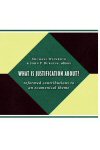
This book offers a Reformed perspective on contemporary ecumenical discussion by carefully exploring the biblical message of justification and then demonstrating how justification as a doctrine functions as an integrative theological principle. Written by an international group of distinguished Reformed scholars, with the support of the World Alliance of Reformed Churches, What Is Justification About? also considers the relevance of justification for social ethics and contemporary cultural issues.
Contributors to this volume are Martien Brinkman, John P. Burgess, George Hunsinger, Chris Mostert, Fazakas Sßndor, Dirkie Smit, Laura Smit, Katherine Sonderegger, Henk M. Vroom, John Webster, Michael Weinrich.
Michael Weinrich is professor of systematic theology and director of the Institute for Ecumenical Theology at the Ruhr-University Bochum, Germany.
John P. Burgess is the James Henry Snowden Professor of Systematic Theology at Pittsburgh Theological Seminary.
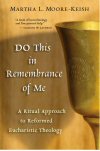
The Reformed tradition has often made doctrine the starting point for Eucharistic theology. In this book Martha Moore-Keish seeks to counter that tendency, placing the Reformed tradition in conversation with liturgical theology and ritual theory to move toward a fuller appreciation of the ritual dimension of the Lord’s Supper.
While liturgical theologians assert more strongly than most Reformed theologians that knowledge of God comes primarily through liturgy, both groups, says Moore-Keish, have not always attended closely to local practice. In keeping with ritual scholars who urge closer attention to particular practices, Moore-Keish argues that we need to be cautious about claiming what the Eucharist universally is and does. We must not allow predetermined “meaning” to blind us to the “doing” of Eucharist in local churches. An in-depth study of a particular congregation helps flesh out Moore-Keish’s thesis.
In the strong tradition of both John Calvin and John Williamson Nevin, here is a book of lucid theology and fine pastoral help. The excellent and gracious summaries of the Reformed tradition, of current liturgical theology, and of ritual studies all lead to healthy proposals about the local practice of the Lord’s Supper that will help in its renewal.
—Gordon W. Lathrop, Charles A. Schieren Professor of Liturgy Emeritus, Lutheran Theological Seminary, Philadelphia
Martha L. Moore-Keish is assistant professor of theology at Columbia Theological Seminary in Decatur, Georgia.
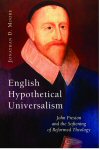
John Preston (1587–1628) stands as a key figure in the development of English Reformed orthodoxy in the courts of Elizabeth I and James VI. Often cited as a favorite of the English and American Puritans who came after him, he nevertheless stood as a bridge between the crown and the nonconformists. Jonathan D. Moore retrieves Preston from his traditional place as one of the “Calvinists against Calvin,” provides a convincing argument for Preston’s unique hypothetical universalism, and calls into question common misperceptions about Reformed theology and Puritanism.
Historians of Stuart England have only recently come to grasp the centrality of the intricate controversies of Reformed theologians about sin and grace, divine sovereignty and human freedom, for the interaction of religion and society, and even for the alignments of local and national politics. Jonathan Moore’s learned, subtle, and incisive exploration of the thought of one of the shapers of Protestant thought in the England of James VI and Charles I brings a new sophistication to the analysis of the place of theology in the intellectual history of early Stuart England. Fascinating in its own right as a study in the varieties of English Calvinism, his study is also an invaluable contribution to our understanding of the theological tensions that provide the context for the English Civil War.
—Eamon Duffy, professor, University of Cambridge
This subtle, shrewd, and learned study of a vitally important topic offers an important corrective to existing work on the period. Jonathan Moore makes a compelling case for John Preston’s hypothetical universalism, and in the process provides a completely new slant not just on the York House Conference but on the whole Arminian dispute that rocked the Church of England in the 1620s. This sophisticated study should be required reading for anyone working on religious thought in the early Stuart period.
—Anthony Milton, professor of history, University of Sheffield
Essential reading for anyone interested in seventeenth-century religion. Clear, confident, and convincing, Jonathan Moore not only transforms our knowledge of John Preston but also reshapes the way in which we view the development of early modern Calvinist theology.
—Alan Ford, pro-vice-chancellor, faculty of arts, University of Nottingham
Jonathan D. Moore is assistant professor of religion at Denison University. He holds a PhD in historical theology from Emmanuel College, University of Cambridge.
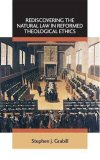
Is knowledge of right and wrong written on the human heart? Do people know God from the world around them? Does natural knowledge contribute to Christian doctrine? While these questions of natural theology and natural law have historically been part of theological reflection, the radical reliance of twentieth-century Protestant theologians on revelation has eclipsed this historic connection.
Stephen Grabill attempts the treacherous task of reintegrating Reformed Protestant theology with natural law by appealing to Reformation-era theologians such as John Calvin, Peter Martyr Vermigli, Johannes Althusius, and Francis Turretin, who carried over and refined the traditional understanding of this key doctrine. Rediscovering the Natural Law in Reformed Theological Ethics calls Christian ethicists, theologians, and laypersons to take another look at this vital element in the history of Christian ethical thought.
Stephen J. Grabill is a research scholar in theology at The Acton Institute for the Study of Religion and Liberty and the inaugural editor of the Journal of Markets and Morality. He was a contributing author for Beyond Self-Interest: A Personalist Approach to Human Action and Human Nature and the Discipline of Economics: Personalist Anthropology and Economic Methodology.
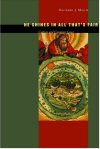
How do Christians account for the widespread presence of goodness in a fallen world? Different theological perspectives have presented a range of answers to this fundamental question over the centuries. In He Shines in All That’s Fair Richard Mouw brings the historic insights of Calvinism to bear on this question and reinterprets them for a broader audience at the turn of the twenty-first century.
Mouw examines long-standing Reformed arguments between those who champion the doctrine of common grace and those who emphasize an antithesis between the church and the world. Defenders of common grace account for the goodness in the world by insisting that God’s grace goes beyond salvation to more general gifts of beauty, virtue, and excellence to all human beings—including those who do not believe in God. Those who reject the doctrine of common grace, on the other hand, emphasize the fallenness of the world and the need for the church to maintain a dramatic contrast to it. These divergent theological perspectives, while seemingly remote and abstract, lead to questions with very practical implications. What common ground do Christians share with those outside the faith? How should Christian treat their non-Christian neighbors? How should Christians relate to the world around them? Does God disapprove when Christians form close friendships with people who are “of the world?” Ought Christians to identify with the joys and sorrows of those who do not confess Christ as their Savior and Lord?
In the course of this book Mouw looks at these topics, connecting the larger theological discussions to pressing issues in contemporary society. He insists that we have much to learn from thinkers who have rejected the idea of common (non-saving) grace, but he also defends the traditional common grace teachings, showing how they provide an important basis for wrestling with key challenges in present-day culture. Ultimately, Mouw argues forcefully for a Calvinism that is capable of standing in awe before the mysteries of God’s gracious dealings with all human beings—and indeed the whole creation.
These soundly reasoned, elegantly written chapters offer an updated, robust understanding of common grace that will be of great value to anyone interested in the relation of church and culture.
This volume received Christianity Today’s Award of Merit—Christianity and Culture, in 2002.
A leading Christian thinker takes up one of the most vexing issues of the Reformed faith. If life is ‘utterly depraved’ without the special grace known in Christ, how can believers engage nonbelievers appreciatively, study science honestly, and honor secular authorities morally? Richard Mouw revisits Calvin, Kuyper, Bavink, and Barth, plus various confessions and critics, gleaning key resources for faithful and creative thinking about cultural life today. A clear, concise, and compelling resource.
—Max L. Stackhouse, Rimmer and Ruth de Vries Professor of Reformed Theology and Public Life Emeritus, Princeton Theological Seminary
The clarity and insight of this book will come as no surprise to people who have read Mouw’s work before. He has an uncommon ability to combine scholarly research with pastoral concern and cultural relevance. He is masterful in his ability to make the Christian faith—and the Reformed tradition in particular—address the needs of today. I found this book to be unusually helpful in sorting out issues that have long vexed me. Intuition tells us that God gives some kind of grace to everyone. Mouw provides a clear and logical rationale for the intuition. He Shines in All That’s Fair is an instance of the very grace Mouw writes about.
—Gerald L. Sittser, professor of theology, Whitworth University
Richard J. Mouw is Distinguished Professor of Faith and Public Life and former president of Fuller Theological Seminary in Pasadena, California.
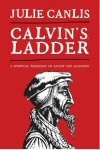
This groundbreaking study offers a sweeping overview and reconsideration of John Calvin’s theology. In Calvin’s Ladder Julie Canlis recovers some of the common (and neglected) themes that Calvin shared with the patristic fathers. She shows that his works are shot through with a vibrant theology of “participation,” thus placing Calvin within the Christian mystical tradition.
A work of both theology and spiritual formation, Calvin’s Ladder suggests an entirely distinctive way of conceiving the relation between God and humanity, challenging not only old caricatures of Calvin but also our own self-portraits.
Calvin’s Ladder was awarded the John Templeton Award for Theological Promise in 2007 and Christianity Today’s Award of Merit in Theology and Ethics in 2011.
It is rare to find a book that is historically rigorous, theologically rich, lucidly written, and at the same time pastorally engaging: this book by Julie Canlis is all of these. A superb exposition of a theme at the very heart of the Christian life.
—Jeremy Begbie, Thomas A. Langford Research Professor of Theology, Duke Divinity School
In this groundbreaking work Julie Canlis offers a bold, new interpretation of Calvin. Alongside his favorite and well-known metaphors of the labyrinth and the abyss we must now unexpectedly place the ladder. Calvin affirms this metaphor only to undermine and reinvent it at the same time. Canlis gives us a striking interpretation of how Calvin and the Reformation understood the doctrine of salvation—an interpretation of wide ecumenical significance.
—George Hunsinger, Hazel Thompson McCord Professor of Systematic Theology, Princeton Theological Seminary
Calvin comes into clear and compelling focus in Julie Canlis’ Calvin’s Ladder as a theologian and pastor who insists that the Christian life at the core is a matter of Christ drawing us into a full participation in all the operations of the Trinity and the community of the church. The academic precision on offer here is in the service of lived, not just argued, theology.
—Eugene H. Peterson, professor emeritus, spiritual theology, Regent College
Julie Canlis won the Templeton Award for Theological Promise in 2007 for her work on John Calvin. She earned a doctorate from the University of St. Andrews and now works in a Church of Scotland parish.
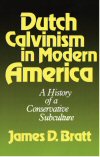
In this scholarly yet entertaining book, James D. Bratt takes a look at the Dutch in America from the late-nineteenth century to the present. A comprehensive study of an ethnic subculture, the book is in large part a study of the group’s religious history as well, since, as Bratt points out, the contours of the Dutch presence in America have been overwhelmingly shaped by the church and its subsidiary organizations. Although the book is extensively and scrupulously documented, Bratt infused his scholarship with a considerable amount of anecdote that is by turns poignant and tragic and hilarious.
In Bratt’s analysis of the fitful progress of Americanization that this close-knit religious community has undergone, we are treated to the sharp insights of a bemused and sometimes disaffected insider. Included is a chapter on novelists Arnold Mulder, David Cornel DeJong, Frederick Manfred, and Peter DeVries—four sons of the Dutch who fled the subculture only to reflect upon it almost obsessively from the outside. Well written, scholarly, and highly readable, Dutch Calvinism in Modern America will have wide appeal among both academic and general readers.
A rare combination of scholarship and wit. Delightful for anyone seeking insight on the Dutch in modern America.
—George Marsden, professor emeritus of history, University of Notre Dame
James D. Bratt is professor of history at Calvin College.
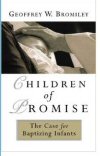
Children of Promise: The Case for Baptizing Infants
- Author: Geoffrey W. Bromiley
- Publisher: Eerdmans
- Publication Date: 1979
- Pages: 132
Infant baptism is an issue that divides the largest Protestant denomination from its sister denominations; and it remains, in many churches, the subject of frequent and sometimes heated debate. This is particularly the case in Reformation churches where the influence of Baptist doctrine has caused members to question their practice of baptizing infants.
Children of Promise is Geoffrey Bromiley’s attempt to “get at the biblical understanding which underlies the continuation of infant baptism in many of the evangelical churches.” In addition to examining the scriptural basis for baptizing infants, Bromiley also considers the meaning of baptism, the relation of baptism to the three persons of the Trinity, and the question of the salvation of infants. A concluding chapter presents a list of guidelines for churches to follow as they examine the practice of baptizing infants.
This is a superb little book, convincingly argued on biblical grounds and very well presented in a clear, commendable, irenic style.
—Thomas F. Torrance, professor of Christian dogmatics, University of Edinburgh
Geoffrey W. Bromiley is also the author of God and Marriage, Historical Theology, and Sacramental Teaching and Practice in the Reformation Churches.
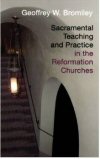
Sacramental Teaching and Practice in the Reformation Churches
- Author: Geoffrey W. Bromiley
- Publisher: Eerdmans
- Publication Date: 1958
- Pages: 112
In the introduction to Sacramental Teaching and Practice in the Reformation Churches, Geoffrey W. Bromiley writes, “In the present study we shall be primarily concerned with sacramental practice and interpretation as they are to be found in the Reformation churches and especially those which took the Reformed rather than the Lutheran path. But this does not mean that we shall be committed merely to an historical survey. The main interest of the Reformers themselves was to be true to the teachings of Holy Scripture itself, and we shall be most loyal to them if, along with the general lines of their tradition, we attempt a biblical rather than an historical statement. This will have a threefold advantage. It will submit the Reformed interpretation itself to its own biblical standard. It will bring us into fruitful contact with other views in which over-emphases or distortions conceal positive elements of truth. And it will give to our discussion a living relevance for Christians of the present day, for whom the sacraments may never be regarded merely as objects of scientific enquiry, but must always be gratefully used as divinely ordained means of blessing.”
Geoffrey W. Bromiley is also the author of God and Marriage, Historical Theology, and Children of Promise.
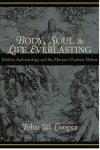
John Cooper writes in the preface to this volume, “Body, Soul, and Life Everlasting was written to remind thoughtful Christians that some sort of “dualistic” anthropology is entailed by the biblical teaching of the intermediate state, a doctrine that is affirmed by the vast majority in historic Christianity. The book makes the case that as Holy Scripture progressively discloses what happens to humans when they die, it teaches not only that each of us will undergo bodily resurrection, but that believers continue to exist “with the Lord” until the resurrection. . . . The argument of the book is mainly exegesis and theological reflection on Scripture, only touching on some of the philosophical aspects of the body-soul or mind-body problem.”
A spirited, erudite, and convincing defense of the orthodox Christian understanding of the immortality of the soul.
—First Things
A clearly written, well-argued defense of mind-body dualism. Anyone with interest in the religious implications of alternative theories of mind, and especially the bearing of these theories on convictions about the afterlife, will find Cooper’s work valuable.
—Philosophy of Religion
Cooper’s overview of the debate and logical analysis of the issues involved are admirable. This book will be of interest to scholars of biblical anthropology and eschatology.
—Religious Studies Review
Cooper provides the exhilarating prospect of permitting us to remain properly and fashionably ‘holistic’ about human nature while yet affirming the ‘dualism’ implicit in Scripture and tradition. . . . Cogent and illuminating.
—The Thomist
John Cooper is professor of philosophical theology at Calvin Theological Seminary in Grand Rapids, Michigan. His other books include Our Father in Heaven: Christian Faith and Inclusive Language for God.
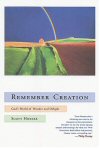
Scott Hoezee asks, “Why is it that many Christians find a theological-scientific debate about creation’s ancient origins far more engaging than a speech about how to live responsibly in the creation today?” Meditating on taking delight in creation and acting as responsible stewards, this volume focuses on Christian ecology for the world today.
Scott Hoezee is pastor of preaching and administration at Calvin Christian Reformed Church in Grand Rapids, Michigan. He is also coauthor of the forthcoming book Flourishing in the Land: The 100-Year Journey of Christian Reformed Missions in North America.
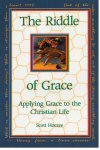
The Riddle of Grace: Applying Grace to the Christian Life
- Author: Scott Hoezee
- Publisher: Eerdmans
- Publication Date: 1996
- Pages: 176
Amid a deluge of books on the topic of grace, this volume breaks new ground. Although Scott Hoezee’s book aims to remind us again of what it means to be saved by grace, it is even more concerned to explore what it means to live graciously as a result of that salvation.
Hoezee first probes the Scriptures to discover the biblical underpinnings of the doctrine of grace. He then wrestles with a key dimension of the gracious life, namely, living gratefully. He explores the gospel threads that weave together grace and the resulting distinctive life of the Christian. Next, Hoezee moves out of a specifically church context into a broader realm—understanding God’s grace and then living the gracious life in today’s capitalist society. Hoezee reminds us that though we live in a society of achievers, grace remains freely given by God. He also has much to say about the impact of grace on business principles. Finally, Hoezee tackles the touchy matter of church discipline.
This highly inspirational volume is intended for any thoughtful Christian who wants to be both informed and transformed by God’s “amazing grace.”
The Riddle of Grace is literate, lively, and—perhaps above all—lovely. Scott Hoezee has written a book that shines with the light of God’s beauty and care, a light that cleanses, attracts, and heals. This deft and candid work manages simultaneously to inform and bless. Bravo!
—Cornelius Plantinga Jr., author, Not the Way It’s Supposed to Be: A Breviary of Sin
I admire Hoezee’s courage in facing some very thorny issues: the scandal of grace, the stubborn gracelessness of much religion, the conundrum of church discipline. Drawing from sources both theological and literary, he brings to these issues wisdom, honesty and, above all, his own manner of grace.
—Philip Yancey, author, The Jesus I Never Knew
Scott Hoezee is pastor of preaching and administration at Calvin Christian Reformed Church in Grand Rapids, Michigan. He is also coauthor of the forthcoming book Flourishing in the Land: The 100-Year Journey of Christian Reformed Missions in North America.
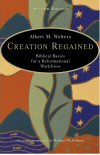
In print for two decades and translated into eight languages, Albert Wolters’ classic formulation of an integrated Christian worldview has been revised and expanded to reach new readers beyond the generation that has already benefited from this clear, concise proposal for transcending the false dichotomy between sacred and secular. Wolters begins by defining the nature and scope of a worldview, distinguishing it from philosophy and theology. He then outlines a Reformed analysis of the three basic categories in human history—creation, fall, and redemption—arguing that while the fall reaches into every corner of the world, Christians are called to participate in Christ’s redemption of all creation. This twentieth-anniversary edition features a new concluding chapter, coauthored with Michael Goheen, that helpfully places the discussion of worldview in a broader narrative and missional context.
Biblically and philosophically sound, Creation Regained offers an understanding that is both refreshing and satisfying . . . Regardless of your theological leanings, you have much to gain from reading his great book. I highly recommend it.
—Randy Alcorn, author, Heaven and The Treasure Principle
Albert M. Wolters is professor of religion, theology, and classical languages at Redeemer University College in Ancaster, Ontario.
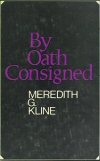
By Oath Consigned: A Reinterpretation of the Covenant Signs of Circumcision and Baptism
- Author: Meredith C. Kline
- Publisher: Eerdmans
- Publication Date: 1968
- Pages: 110
Covenant theologian Meredith C. Kline wrote this volume in defense of infant baptism.
Meredith C. Kline (1922–2007) was an Old Testament scholar, theologian, Egyptologist, and Assyriologist. Kline held doctorates in Assyriology and Egyptology from Dropsie College, as well as a ThB and ThM from Westminster Theological Seminary. He taught Old Testament for over 50 years at various seminaries across the United States, and was an ordained minister in the Orthodox Presbyterian Church.
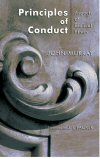
This classic study by theologian John Murray clearly shows the organic unity and continuity of the biblical ethic. Murray addresses ethical questions relating to such topics as marriage, labor, capital punishment, truthfulness, Jesus’ teaching in the Sermon on the Mount, law and grace, and the fear of God. Though the Ten Commandments furnish the core of the biblical ethic, Murray points the reader again and again to all of Scripture as the basic authority in matters of Christian conduct.
John Murray (1898–1975) was born in Scotland, educated in Glasgow, Edinburgh, and Princeton. He spent most of his career teaching systematic theology at Westminster Theological Seminary in Philadelphia.
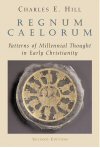
This study in early Christianity by Charles E. Hill examines the New Testament—as well as Jewish texts and early Christian writings—to offer a new view of the development of Christian eschatology.
A major contribution to the field of early Christian studies. Highly recommended.
—Choice
A stimulating piece of historical detective work and a significant and balanced reconstruction of patristic eschatological materials.
—Westminster Theological Journal
A well-written and well-documented survey of millenarianism in the early church.
—Expository Times
Hill corrects familiar expositions of texts. . . . Students of New Testament, church history, and systematics should take note.
—Theology
The argument of the book is exciting. . . . If Hill is right, Christians were distancing themselves from their Jewish brethren at the earliest opportunity and in the deepest possible way.
—Journal of Ecclesiastical History
Hill’s study is abundantly and carefully documented, and is provided with a thorough bibliography covering most secondary works written over the last century that are relevant to the subject. The book is densely but lucidly written, tightly argued, learned, original, and painstakingly thorough—a model of well-focused and well-informed patristic scholarship.
—Journal of Theological Studies
Charles E. Hill is associate professor of New Testament at Reformed Theological Seminary in Orlando, Florida.
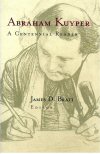
Abraham Kuyper (1837–1920) is one of the most remarkable men in the history of Reformed Christianity. He was eminent in Dutch public life for half a century and left a deep imprint on Dutch immigrant communities in the United States, Canada, and South Africa. A theologian, politician, journalist, university founder, and seminal thinker in the history of modern Calvinism, Kuyper offered an engaging critique of the nineteenth century that still has much to say at the end of the twentieth.
This anthology, published in the centennial year of Kuyper’s famous Stone Lectures, gathers sixteen key writings by Kuyper never before available in English. Included in this volume are Kuyper’s definitive statements on politics, education, culture, and the religious currents and social problems of his time. Also included are Kuyper’s own conversion narrative, his critiques of modernism and of Holiness theology, his proposals on common grace and Calvinist politics, his reflections on a culture in thrall to pantheism and evolution, and his classic address on “sphere sovereignty.”
Freshly translated and rendered in a clear, accessible style, these writings clearly display Kuyper’s wide-ranging and creative Christian mind. Editor James Bratt provides helpful explanatory notes and an introduction to each piece. Photographs, cartoons, and short excerpts from some of Kuyper’s better-known works also make this an attractive volume that will stand as the premier Kuyper reader for years to come.
Bratt is a skilled editor, and his selections from Kuyper have the advantage of representing both different periods in Kuyper’s development and the major themes in the Dutch conservative’s thought. . . . Although it has been a century since Kuyper presented his ideas to an American audience in the Stone Lectures at Princeton Seminary, many American religious historians are just beginning to appreciate his impact on American evangelicalism. Yet, much of neo-evangelical as well as present-day evangelical theology is inexplicable without Kuyper in the background. Bratt has done American religious historians a major service by publishing these texts in a single volume.
—Church History
Bratt not only sets Kuyper’s work in its nineteenth-century context but shows the relevance of his ideas to contemporary debates on modernism, evangelicalism, and fundamentalism.
—Library Journal
The appearance of a new hefty volume . . . is consequently a major event. The essays in the collection, skillfully edited and introduced by James Bratt, display the range of Kuyper’s intellectual contributions. . . . Kuyper’s writings deserve sustained attention. . . . As a successful politician, Abraham Kuyper may provide a model of Christian statesmanship. But it is as a thinker that he offers what we need most: a way for theologically informed Christians to grasp both what they should seek, and what they should not seek, from politics in a democracy.
—The Weekly Standard
James D. Bratt is professor of history at Calvin College.
This title is included in the following collections
You can save when you purchase this product as part of a collection.
Bible Reference Bundle 2.0
$4,512.95$3,599.99Logos 8 Reformed Portfolio Leg...
$4,749.99$4,749.99Logos 8 Collector's Edition Le...
$11,399.99$11,399.99Logos 8 Ultimate Legacy Librar...
$21,749.99$21,749.99
- $37,403.33$27,999.99